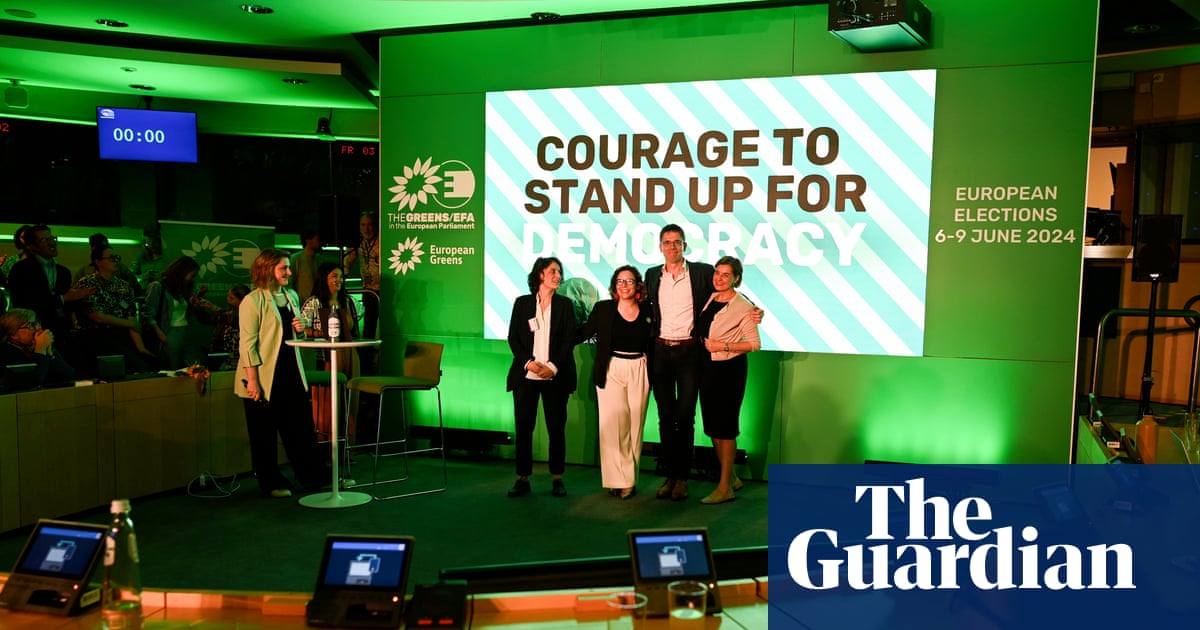Green parties have shed seats in the European elections, provisional results suggest, raising fears that the continent may be on the verge of weakening its climate ambitions. Projections for the new European parliament showed the Green faction pushed from fourth into sixth place, with 53 seats, amid a broader shift to the right.
In Germany, a core Green stronghold, the party’s vote share appears to have nearly halved since the last election in 2019. Exit polls suggested it fell 8.5 percentage points from 20.5% to 12%. In France, where the far right was leading and President Emmanuel Macron called snap elections, support for the Greens fell by the same amount.
But the party scored smaller victories elsewhere. In Denmark counting showed the Greens with three seats, a gain of one, while in Sweden they were expected to have held three seats. A Green-Left coalition looked to have narrowly beaten the far-right for first place in the Netherlands.
Bas Eickhout, one of the two lead candidates for the Green party, said he was not disheartened by the projected results and pledged to push for an acceleration of the Green Deal.
after newsletter promotion
“I wouldn’t say that this is a referendum on the Green Deal itself,” said Eickhout, referring to a package of environmental policies whose cross-party support started to fray in the final months of the outgoing parliament.
“Even if that were [the case], there are mixed results,” he added. “We have become the biggest in the Netherlands. Would you then say the Netherlands is in full support of the Green Deal – and Germany not? I think that’s too simplistic.”
The Greens did unusually well at the last elections in 2019 as student protesters led by Greta Thunberg forced climate change up the political agenda. But the faction is expected to lose votes as war and economic troubles crowd out environmental concerns in the minds of voters.
They could still play a key role in choosing the next EU Commission president, depending on the level of support for centrist parties.
In Germany, where the Greens are in a coalition government, the losses were met with disappointment from the party and climate activists. They have traditionally been buoyed by younger voters, some of whom now appear to have drifted to the far-right Alternative für Deutschland (AfD), as well as newer parties, according to polling data from public broadcaster ZDF.
Across Germany, the Greens’ biggest losses appear not to have gone to another party – but to people who did not vote at all.
“I think voters are giving very mixed signals,” said Eickhout, commenting on the reported shifts in young German voters.
He also said there was “one big lesson is that our biggest problem so far is that the Green Deal has been too much a Brussels agenda” and called for more debate in the 27 member states.
Political scientists doubt there has been a widespread backlash against European climate policy, but warn that badly designed measures – particularly ones that hit poorer households hardest – can backfire.
Aurélien Saussay, assistant professor at the Grantham Research Institute on Climate Change and the Environment, said climate policies that hit households directly can trigger a strong backlash “even in a population that doesn’t doubt the reality of climate change”.
“Despite these election results, polling shows that Europeans’ concern for the climate crisis remains very high,” said Saussay.
Environmental groups in Brussels expressed dismay at the projections, but stressed the need for the new parliament to cut pollution.
“This election will not make the climate and nature crisis any less existential,” said Ariadna Rodrigo, a campaigner at Greenpeace EU. “Flooding, droughts and heatwaves will only get worse – and all newly elected politicians will have to act to maintain our planet’s ability to sustain life and give our children a future.”

